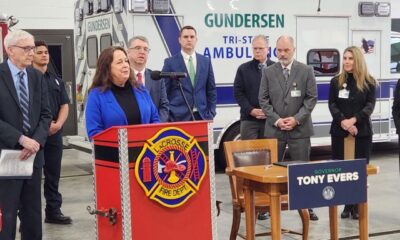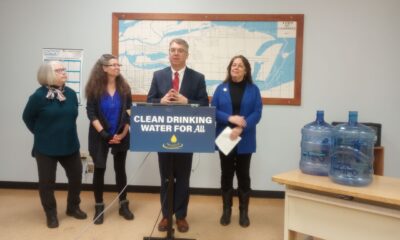Wisconsin
Evers wants nearly $70M in bonding to address water quality

MADISON, Wis. (AP) — Gov. Tony Evers will call for allowing state environmental and agricultural officials to borrow nearly $70 million more over the next two years to combat water pollution and replace lead pipes in his first state budget, following through on his pledge to attack drinking water contamination during his first year in office.
Evers is expected to unveil the full two-year spending plan on Feb. 28 but gave The Associated Press a broad preview of his water quality initiatives. The governor called his plan an investment that will improve water quality across the state.
It’s unclear how the proposals will go over with Republicans who control the Legislature. They’ve formed their own water pollution task force and are drafting their own bills to attack many of the same problems.
Still, Wisconsin League of Conservation Voters lobbyist Jennifer Giegerich called Evers’ budget plans “a good first step to addressing our drinking water crisis.”
“We are very supportive of increasing bonding for these programs,” she said.
State agriculture officials would be allowed to borrow another $3 million over two years to fund grants to farmers for building infrastructure that reduces pollution from agriculture. The agency currently is allowed to borrow $7 million.
The Department of Natural Resources, meanwhile, would be allowed to bond for about $65 million more. The money would go toward grants for local governments to reduce pollution; cleaning up contaminated soil along the Milwaukee and St. Louis rivers; and loans to municipalities to cover half the cost of replacing lead pipes.
Evers also wants to spend an additional $300,000 on studies on water pollution management and implementing new manure-spreading restrictions the DNR enacted last year along Wisconsin’s Lake Michigan shoreline, where porous Silurian bedrock allows contaminants to seep into groundwater more easily.
He wants to spend $1.46 million on other initiatives, including educating farmers, establishing a pollution best management practices website and developing software to help farmers use fertilizer.
The Wisconsin Farm Bureau Federation was still analyzing Evers’ proposals. WFBF lobbyist Karen Gefvert’s response was guarded.
“Increased funding for northeast Wisconsin’s (Silurian bedrock) areas would help farmers implement the new performance standards,” she said in an email. “In order for farmers to implement best management practices increased funding for education and outreach is important.”
The governor also wants to create four new DNR positions to speed up implementation of new water quality standards in the Wisconsin, Milwaukee, Rock and St. Croix river basins.
Wisconsin has struggled with groundwater contamination for decades. A survey conducted by county health departments between 2007 and 2010 found 47 percent of nearly 4,000 wells used by low-income families with pregnant women or young children had levels of contaminants that exceeded water quality standards.
A third of the wells in Kewaunee County tested in 2015 had unsafe levels of nitrates and bacteria. A November survey by the Wisconsin Geological and Natural History Survey, the U.S. Department of Agriculture and the U.S. Geological Survey found 42 percent of 301 randomly selected wells in Iowa, Grant and Lafayette counties exceed federal standards for bacteria.
Meanwhile, at least 176,000 Wisconsin homes and businesses get water through lead service lines. Lead from the lines can flake off into the water and cause permanent brain damage in children. Replacing a single line can cost thousands of dollars.
Evers pointed to the problems in his State of the State address last month, declaring 2019 the year of clean drinking water .
It’s unclear whether Evers’ initiatives will survive the Republican Legislature. After he introduces the spending plan later this month, Republicans lawmakers will spend the spring and early summer revising the document before sending it back to Evers for his signature.
Kit Beyer, a spokeswoman for Assembly Speaker Robin Vos, and Alec Zimmerman, a spokesman for Senate Majority Leader Scott Fitzgerald, didn’t immediately respond to an email seeking comment on Evers’ plans.
Republican reaction to Evers’ declaration in his speech was guarded. Vos last month formed his own water quality task force and Sen. Rob Cowles said he’s crafting what he called “major water initiatives” of his own, including a bill that would shift the full $345 annual factory farm water pollution permit fee to the DNR. Right now $95 goes to the agency for permit enforcement and $250 goes to the state’s general fund.
Follow Todd Richmond on Twitter at https://twitter.com/trichmond1







